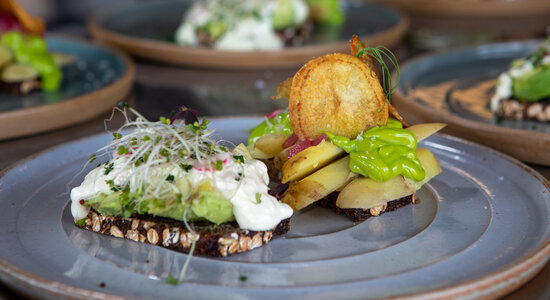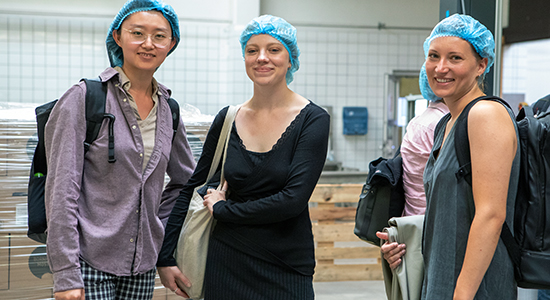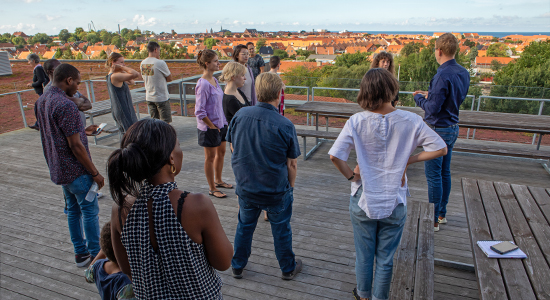Summer school at Bornholm
Food, Places, & Innovation - Role of Food & Gastronomy in Sustainable Food Systems Transformation
7th edition: September 12 – 16, 2025
Over recent years mobility and gastronomy have come to play an increasingly important role in place based strategies to develop sustainable local food systems. Such development is dependent on strategies that stimulate local food production and contribute to livable local communities. And it needs to take the needs and expectations of the increasingly global and mobile consumer into account. While tourism is often portrayed as having mainly negative effects on destinations, there is also reason to believe that tourism can play a more positive role in the transition towards more sustainable food systems.
This years summerschool will address how tourism can generate positive change and development in the food tourism sector in local communities, and how involved actors can work together towards new and/or alternative strategies and business models to sustain livable local communities and resilient food systems.
Participation fee: All meals, on-island transfers, accommodation in single room: 4950 DKK
Participation fee: All meals, on-island transfers, accommodation in double room: 2950 DKK
The Summer School ia a satellite event to the Nordic Tourism Symposium. Read more about the symposium here
Program-at-a-glance
|
|
Friday September 12 |
Saturday September 13 |
Sunday September 14 |
Monday September 15 |
Tuesday September 16 |
|
Breakfast |
|
Gaarden |
Gaarden |
Campus Bornholm |
Gaarden |
|
Morning |
|
Welcome Practicalities Lectures |
Lectures |
Field Trips Rønne |
Prep for presentation |
|
Lunch |
|
Gaarden |
Gaarden |
Campus |
Gaarden or Norresan |
|
Afternoon |
Transfers from sea- and airport |
Field Trips Nexø |
Lectures |
Field Trips Rønne |
Present Group work (WGA) |
|
Dinner |
Gaarden |
Take away Nexø Smokehouse |
Nexø |
Rønne |
Closure 16:00 |
|
Evening |
Opening lecture |
Group work |
Off duty |
Transfers from sea- and airport |
|
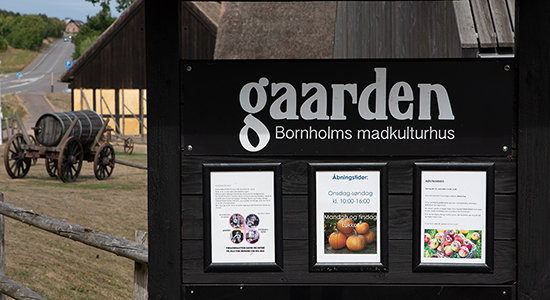
The written group assignment is an academic piece of work that follows the IMRaD format, which involves on-course data collection based on collaborative inquiry. It will be done in groups, presented on the last day where feedback will be given. Based on feedback groups will submit the final WGA (15 pages). The WGA needs to be submitted on September 23 and will allow you – if approved - to get an extra ECTS point on top of the 2 ECTS that course attendance alone will give. The main goal of the WGA is to explore a chosen local case with respect to how the idea of place can be used in the innovation and value creation efforts that is needed to create more sustainable Food System. The idea of Place - and placemaking – is based on the idea that both nature and culture can create intangibles as well as tangibles. It means that climate (temperature & humidity), nature (soil, land & its structure), as well as culture, tradition & know-how can create value and used in innovation both when it comes to products and services. Methodological approaches for Place-based food studies will be presented during the course. The WGA should be structured according to the IMRaD format and should as a minimum include:
INTRODUCTION (WHY)
What is the rationale for your choice of case . Introduce the case and explain both the place as well as the innovation dimension and aspects. For your information, The place and innovation dimension will be introduced during the course. You may explain why it is interesting from a research point of view, taking the existing literature into account. What is your “take” and what gaps in the existing knowledge does is fill. End up with a hypothesis and or problem definition. And make sure to return to exactly that by the end of your WGA:
METHOD (HOW)
Describe how you have been collecting data to understand the case. Make sure to argue for your choice of approach whether quantitative or qualitative. The method chapter should be organized in a chronological order and should relate to both of the ideas of Place and Innovation. If you take a certain theoretical or conceptual approach you can add a section on that.
RESULT (WHAT): Describe the findings, results and outcomes of your study. The result should answer the question you have raised in the problem definition of the introduction.
DISCUSSION (SO WHAT)
Reflect critically on your findings. The discussion should evolve around the following bullets: Results (what was you findings and how do they add to what others has found), Methods (how well chosen was your methods in terms of reliability and validity and what was strength and weaknesses and Policy Implications (what should others do based on you findings either at research, practitioner or policy level). If you have taken a certain theoretical or conceptual approach you need to revisit and discuss that as well. And finally don’t forget to revisit your initial hypothesis or problem definition and answer or discuss that.
REFERENCES
Please provide a list of references for your work. In the running text please use the Harvard style for referencing.
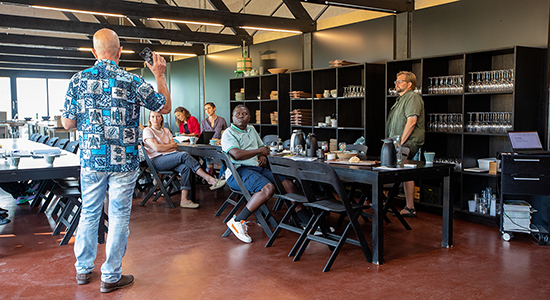
LOCATION?
Venue: The summer school is held at Melstedgaard, House of Food Culture, Bornholm and with accommodation in walking distance at Gudhjem Holiday Homes.The venue is 24 km north of Rønne. Its located on the north of the island of Bornholm.
Accommodation. We use Gudhjem Holiday Homes for accommodation. The houses are apartments that can accommodate 5 persons in 2 separate rooms and one in the living room (double occupancy). If you chose single occupancy you will have your own room and share the apartment with only one other person. Please remember to bring linen. If you don’t want to bring you own you can rent it for 130 DKK a week. There are 2 prices: Double occupancy and single occupancy are available.
Extra shopping: More options are available in Gudhjem if you want to shop for some extra food and groceries near the accommodation. Its walking distance.
The island: The isle of Bornholm is famous for its unique mixture of remoteness and connectedness. Bornholm food ecosystem is one of the main dynamos of gastronomic innovation in Denmark. You can read more about the gastronomic surge that has swept the island over the past decade in the Guardian, Vogue and in New York Times.
HOW TO GET THERE
How to get there: Bornholm is located in the middle of the Baltic Sea but well connected to both Denmark, Sweden, Germany and Poland. By air Bornholm is 35 minutes from Copenhagen and approximately 1 hour from Danish airports Billund, Aalborg and Sønderborg. By ferry Bornholm is 1 hour and 20 minutes away from Ystad on the Southern tip of Sweden. Other ferry routes: Køge (DK) 5½ hours. Sassnitz (DE) 3½ hours. Świnoujście (PL) 5 hours. Going overland from Copenhagen takes you through Southern Sweden, is easy and takes around 2½ hours by car, bus or train. Remember to stay updated on border control procedures and always carry your passport (or photo ID if you are a Scandinavian citizen). One way bus prices start from approx. 15 € If you are flying to Rønne you are on a domestic route and are formally staying within Denmark. If you come from CPH airport or downtown the easiest connection is the Kombardoexpress: https://www.molslinjen.com/booking#/trip-details. It includes both ferry and bus to Rønne.
Local transport: All connections to Bornholm is through the main sea- or airport of Rønne on the south western tip of the island. Please note that the Danish travel card (the Rejsekort) is being implemented in 2025 on Bornholm so have some cash handy if you want to go by bus. Bornholm is the bicycle Island of Denmark with spectacular bike paths and bikerental is easy and cheap. Expect to pay 10 €/day if you want to rent a bike and want to use bike for going Rønne (24 km). Being on Bornholm you are never far from the sea so if you are a swimmer don’t forget to bring your swim gear.
PRACTICALITIES
Organizers: The summer school is organized by UCPH-IGN. Department of Geosciences and Natural Resource Management, Copenhagen University and Lund University in cooperation with House of Foodculture Melstedgaard. The summer school diploma is issued by SCI-PHD, the PhD School at the Faculty of Sciences at UCPH.
Registration fee: A registration fee will be charged per participant. It covers administration, transport, accommodation and all meals during the course. There are 2 types of fees depending on whether single or double occupancy is chosen:
- Participation fee: All meals, on-island transfers, accommodation in single room: 4950 DKK
- Participation fee: All meals, on-island transfers, accommodation in double room: 2950 DKK
Participant template
Please remember to fill out the participant template which is a profile of you with photo research interest background can site details and most importantly your arrival and departure details feeling out this gives us an opportunity to arrange the transfers from either the seaport or the airport and make sure that you are taken back when the course ends to reach your connection.
The written group assignment is an academic piece of work that follows the IMRaD format, which involves on-course data collection based on collaborative inquiry. It will be done in groups, presented on the last day where feedback will be given. Based on feedback groups will submit the final WGA (15 pages). The WGA needs to be submitted on October 1st. Examples of questions that the WGA could focus on include but are not limited to:
- The role of stakeholder networks in development of sustainable food systems in local communities?
- How can food networks be organised to stimulate sustainable local development?
- How can we stimulate touristic behaviors that can generate positive development?
- How can policy makers, destination actors and local inhabitants work together to develop sustainable food systems?
- How can destinations cope with seasonal tourism and the possible effects thereof (e.g. on resources s.a. water, energy, food)
- The role of knowledge development and capacity building as a catalysator for sustainable food systems transformation
- The role of data and digital solutions for sustainable food systems
- To what extent can sustainability-conscious travelers contribute to innovation in circular solutions for tourism sustainability
- What role can urban governance play in such development?
- How can destination development in this field can go hand in hand with local foodsystems development for the benefit of local food economy and residents.
Kontakt
| Bent Egberg Mikkelsen E-mail: bemi@ign.ku.dk Phone: +45 35 33 74 64 |
Subash Rana sr@ign.ku.dk |
Mukti Ram Chapagain mrc@ign.ku.dk |
